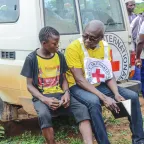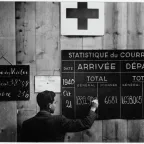An inevitable trajectory of humanitarian needs?
… over human life. Powerful explosive weapons are deployed in urban areas with little … will be a catastrophic third world war or a nuclear attack in their lifetimes. But it is …
… over human life. Powerful explosive weapons are deployed in urban areas with little … will be a catastrophic third world war or a nuclear attack in their lifetimes. But it is …
… in some parts of the world. They often carry weapons and actively take part in the fighting. … chemical, biological, radiological or nuclear materials can have long-term effects on … of a chemical, biological, radiological or nuclear nature). The exact nature of the risks …

… Justice, Legality of the Use by a State of Nuclear Weapons in Armed Conflict, Advisory Opinion, …
… of the Treaty on the Prohibition of Nuclear Weapons (TPNW). Only seven more ratifications …

… efforts to work towards the elimination of nuclear weapons. "Urban warfare has a devastating …

… The Korean War is fought under the shadow of nuclear weapons at the start of the Cold War. ICRC …

… medical units and the humanitarian impact of nuclear weapons. Participants at the first of two panel …

… cost for civilians on earth of the use of weapons and other military operations in, or in … • The placement in orbit of objects carrying nuclear weapons or other weapons of mass … of Justice, Legality of the Threat or Use of Nuclear Weapons, Advisory Opinion, 8 July 1996, …

… ceremony of the Treaty on the Prohibition of Nuclear Weapons. "The choice to 'focus on people' is …

… and the environment, and regulations on weapons use, including bans on biological, … of weapons. Video Let's decide the future of nuclear weapons before they decide ours. Is the world ready to face a nuclear war? No. So let’s ban the bomb. …

Try one of the following resources:
Created in 1863, the ICRC library, alongside the ICRC archives, provides an indispensable documentary reference on the organization itself and international humanitarian law.
International humanitarian law is based on a number of treaties, in particular the Geneva Conventions of 1949 and their Additional Protocols, and a series of other instruments.
Customary international humanitarian law consists of rules that come from "a general practice accepted as law" and that exist independent of treaty law.